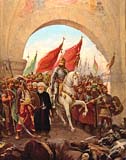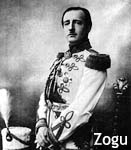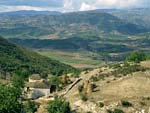Albania can trace its historical roots back to the prehistoric era some 300,000 years ago when nomadic peoples roamed the area, living out of various caves across the land.
Starting in the 7th century BC, Greek colonies began popping up along the Illyrian coast, and for the next several centuries the Illyrian tribes dominated the region. It wasn't until the 1st century BC that the Roman army defeated the Illyrians, ending their independence.
The Romans ruled here until 395 AD when the empire was split in half, and the area of present-day Albania was put under Byzantine command.
Under the Byzantines, Albania endured raids by variousEuropean tribes including the Visigoths, Huns, Ostrogoths, Avars and Croatians, and by early 7th century AD most of the empire was either destroyed or weakened.
In the mid-800s the Bulgarian Empire took over, and the area of eastern Albania became a valuable cultural center.
As the Bulgarian Empire declined in the late 13th century, Albania switched hands yet again, becoming integrated this time into the Serbian state.
The Ottomans took control in 1385 with the Battle of Savra, and aside from a brief interruption during 1443-1478, they ruled for an astounding 600 years.
 During this time many native Albanians reached notable rankings within the Ottoman government, remaining highly active and faithful during the Ottoman era. However, by the late 1800s the nationalism had faded, and the Albanian people began to pursue their independence.
During this time many native Albanians reached notable rankings within the Ottoman government, remaining highly active and faithful during the Ottoman era. However, by the late 1800s the nationalism had faded, and the Albanian people began to pursue their independence.Toward the end of the 19th century many revolts were organized, and the Albanian National Awakening took place, but it wasn't until the Balkan War of 1912 that the Albanians were freed from their Ottomans rule.
As Albania began to establish its new boundary lines and put together a government, World War I interrupted their efforts, and political turmoil overwhelmed the country.
Prince William of Wied, who was appointed King, left Albania during that war to serve in the German Army, and never returned to claim his position.
Albania was consequently divided among Italy, Serbia, andGreece. As World War I ended, the country was still without a recognized government.
Worried that their independence was coming to an end, Albania struggled to regain control. In 1920 the United States intervened in support of Albania's independence, which ultimately led to the League of Nations accepting Albania as a full member.Despite the acceptance of Albania by the League of Nations, the government still scrambled to retain order. Between July and December of 1921 the premiership was switched at least five times.
 Finally, in 1924, Ahmed Bey Zogu victoriously defeated the current Prime Minister, Fan Noli, with the help of the Yugoslav military, and was elected president for a seven-year term. Zogu was given dictatorial powers, formed an alliance with Italy, and established good relations with Benito Mussolini.
Finally, in 1924, Ahmed Bey Zogu victoriously defeated the current Prime Minister, Fan Noli, with the help of the Yugoslav military, and was elected president for a seven-year term. Zogu was given dictatorial powers, formed an alliance with Italy, and established good relations with Benito Mussolini.Albania's parliament shifted in 1928, becoming a Kingdom with Zogu as appointed King. King Zog I, as he was henceforth referred to, still held onto his dictatorial powers.
As Albania's alliance with Italy crumbled, and the country failed to make interest payments to Italy on loans, Mussolini's army invaded Albania, eradicating King Zog.
Albania was one of the first nations occupied by the Axis Powers during World War II, and resulting in a tug-of-war between Italy, Germany and Greece.
Unfortunately this spelled disaster for the Albanians, and by the war's end some 30,000 residents were dead, 200 villages totally destroyed and around 100,000 left homeless.
In their weakened state, Communists quickly invaded Albania, and isolated them from the rest of the non-communist world. This lasted until the early 1990s when most of the Communist doctrine collapsed across Europe.
Albania took this moment to completely abandon its long-time Communist rule in favor of democracy and a move into the 21st Century.
 Blessed with many natural resources, Albania has (for the most part)remained somewhat isolated from the world because of its mountainous topography and the policies of its former hard line government.
Blessed with many natural resources, Albania has (for the most part)remained somewhat isolated from the world because of its mountainous topography and the policies of its former hard line government. In recent times the country has suffered economic hardships because of the onslaught (into Albania) of thousands of ethnic Albanian Muslims exiting the former Yugoslavia.
However, in 2009 the country joined the North Atlantic Treaty Organization (NATO), and has applied for EU membership.
Tourism to Albania has increased in recent years, and this comes as no surprise due to the country's pristine beaches, impressive mountain ranges, delicious cuisine, and genuine hospitality.
Albania's capital, Tirana, is host to a vibrant nightlife, while the countryside has become a growing mecca for backpackers.
No comments:
Post a Comment